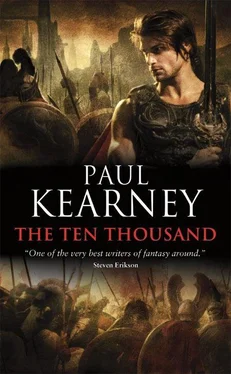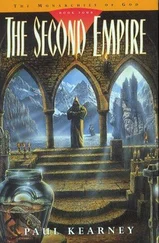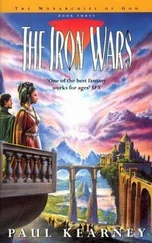Paul Kearney - The ten thousand
Здесь есть возможность читать онлайн «Paul Kearney - The ten thousand» весь текст электронной книги совершенно бесплатно (целиком полную версию без сокращений). В некоторых случаях можно слушать аудио, скачать через торрент в формате fb2 и присутствует краткое содержание. Жанр: Фэнтези, на английском языке. Описание произведения, (предисловие) а так же отзывы посетителей доступны на портале библиотеки ЛибКат.
- Название:The ten thousand
- Автор:
- Жанр:
- Год:неизвестен
- ISBN:нет данных
- Рейтинг книги:5 / 5. Голосов: 1
-
Избранное:Добавить в избранное
- Отзывы:
-
Ваша оценка:
- 100
- 1
- 2
- 3
- 4
- 5
The ten thousand: краткое содержание, описание и аннотация
Предлагаем к чтению аннотацию, описание, краткое содержание или предисловие (зависит от того, что написал сам автор книги «The ten thousand»). Если вы не нашли необходимую информацию о книге — напишите в комментариях, мы постараемся отыскать её.
The ten thousand — читать онлайн бесплатно полную книгу (весь текст) целиком
Ниже представлен текст книги, разбитый по страницам. Система сохранения места последней прочитанной страницы, позволяет с удобством читать онлайн бесплатно книгу «The ten thousand», без необходимости каждый раз заново искать на чём Вы остановились. Поставьте закладку, и сможете в любой момент перейти на страницу, на которой закончили чтение.
Интервал:
Закладка:
Paul Kearney
The ten thousand
PART ONE
ANTIMONE’S PITY
ONE
THE MEANING OF DEFEAT
By the sea, Rictus had been born, and now it was by the sea that he would die.
He had thrown away his shield and sat on a tussock of yellow marram grass, with the cold grey sand between his toes and a blinding white lace of foam from the incoming tide blazing bright as snow in his eyes.
If he lifted his head there was real snow to be seen also, on the shoulders of Mount Panjaeos to the west. Eternal snow, in whose drifts the god Gaenion had his forge, and had hammered out the hearts of stars.
As good a place as any to make an end.
He felt the blood ooze from his side, a slow promise, a sneer. It made him smile. I know that, he thought. I know these things. The point has been made. A spearhead from Gan Burian has made it.
He still had his sword, such as it was, a cheap, soft-iron bargain he’d picked up more out of a sense of decorum than anything else. Like all men, he knew his real weapon was the spear. The sword was for defeat, for the black end when one could no longer deny it.
And he still had a spear, Eight feet tall, the old, dark wood of the shaft scored now with new scars of white. It had been his father’s.
My father. Whose home, whose life I have now thrown onto the scales.
Again, he smiled under the heavy helmet of bronze. But it was not a smile. It was the final baring of teeth that the bayed animal must show.
And so they found him, three winded foot-soldiers of Gan Burian who had also cast aside their shields, but to aid pursuit, not flight. These too had their spears, every point bloodied, and in their eyes there was that glaze which comes to men from wine, and sex, and killing. They gave a shout as they sighted him, this bowed figure by the shore of the sea, his tunic bloody at the side. And now they darted a change of course as swiftly as fish in shoal, teeth bared. Happy. As happy as man can be. For what can make man happier than the annihilation of his enemy when all is at risk: his woman, his child, the place he calls a home? The men of Gan Burian had defended their city from attack in a wrenched, bowel-draining fight which had lasted all of the morning. They had won. They had won, and now, how bright the sky seemed, and how good did the fine salt air off the sea taste in their mouths. The sweetest of all dishes. And now, they would savour a little more of it.
Rictus saw them come, their feet raising little surfs of sand as they bounded across the dunes towards him. He stood up, ignoring the pain as he had been taught. He filled his lungs with that good, cold air, that salt, that slake of earth. Closing his eyes, he smiled a third time; for himself. For the memory of the sea, for the smell.
Lord, in thy glory and thy goodness, send worthy men to kill me.
He leaned on the spear a little, digging the spiked butt into the sand, sinking it past the gleam of the bronze. He waited, not even bothering to touch the leather scabbard wherein lay his contemptible little sword. Past his head there broke a black and white formation, a piping squadron of birds. Oyster catchers, frightened off the flats of sand by the men who approached. He was as aware of their wingbeats as he was of the slow pulse in his side. Death’s abacus, the beads knocking home ever slower. A moment of strange bliss, of knowing that all things were the same, or at least could be the same. The drunken clarity of pain, and fearlessness. It was something-it truly was something-not to be afraid, at this moment.
And they were here, right before him. He was startled, as he had not been startled all day, not even when the shield-lines met. He had been prepared for that crash all his life, had expected it, had wanted it to be even grander than it had been. This was different. It was seeing other ordinary men with his murder in their eyes. Not anonymous, but as personal as could be. It shook him a little, and that uncertainty translated into a white-cold flood of adrenaline through each of his nerves. He stood, blinked, forgot the pain and pulse of his life-blood as it trickled out ol him. He was the beast at bay, about to snarl at the hunters.
They spread about him; ordinary men who had killed their fellows and found it quite good. A sport almost. They had come uncertain and apprehensive to battle, and had prevailed. With the breaking of their enemy’s line they had found themselves heroes, part of what might one day be history. Later they would reform into their phalanxes and would make the light-hearted march to the city of their foes, and would there become conquerors. This-this killing-was no more than a garnish on the dish.
Rictus knew this. He did not hate these men who had come to kill him, as he was quite certain they did not hate him. They did not know that he was an only son, that he loved his father with a fierce, never-to-be-spoken adulation. That he would die to save the least of his family’s dogs. They did not know that he loved the sight and smell and sound of the sea as another man might love to let gold coin trickle through his fingers. Rictus was a bronze mask to them. He would die, and they would brag to their children of it.
This is life, the way things work. All these things, Rictus knew. But he had been taught well, so he took his father’s spear in both fists and ignored the pain and started thinking about how to kill these smiling men who had come about him.
With a short, yipping yell, the first bounced in to attack, a high-coloured face with a black beard framing it, and eyes as bright as frosted stones. He held his spear at the midpoint of the shaft, and thrust it at Rictus’s collarbone.
Rictus had grasped his own weapon at the balance-point, a short arm’s length from the butt, and thus had a longer reach. Two-handed, he clapped aside the point of his attacker’s spear and then reversed the grip of his own-all in a movement which was as beautiful and fluid as the steps of a dance. As his own spear spun, it made the other two men jump backwards, away from the wicked edge of the aichme, the spearhead. Two-handed again, he lunged with the sauroter, the lizard-sticker they called it, a four-sided spike of bronze which was the aichme’s counterweight. It struck the black-bearded man to the left of his nose, punched through the thin bone there for the depth of a handspan before Rictus jerked it out. The man staggered backwards like a drunkard, blinking slowly. His hand came up to his face, and then he sat down hard on the sand as the blood came spurting from the square-sided hole in it, steam rising in the cold air.
Another of the three screamed at this, raised his spear over his shoulder and charged. Rictus had time only to throw himself aside and went sprawling, his spear levered out of his grasp as the aichme plunged in sand. As he got up the third man seemed to rouse himself also, and stumped into the fight unwillingly. He was older, a greybeard, but there was a black calm about his eyes. He moved in as though thinking about something else.
Rictus rolled as the second man’s spear stabbed the sand at his side. He got his arm about it and clamped the spearhead against his injured ribs, the pain scarcely felt. Then he kicked up with both feet and one heel dunted his attacker in the groin. The man’s cheeks filled. Rictus came up off the ground at him, climbing up the spear-shaft, and butted him in the face with all the strength left in his torso. The bronze of his helmet rang, and he was glad of it for the first time that day. The man fell full length on his back and coiled feebly in on himself and the red ruin of his face.
A moment of triumph, so brief it would not even be recalled later. Then something seized the horsehair crest of Rictus’s helm from behind.
Читать дальшеИнтервал:
Закладка:
Похожие книги на «The ten thousand»
Представляем Вашему вниманию похожие книги на «The ten thousand» списком для выбора. Мы отобрали схожую по названию и смыслу литературу в надежде предоставить читателям больше вариантов отыскать новые, интересные, ещё непрочитанные произведения.
Обсуждение, отзывы о книге «The ten thousand» и просто собственные мнения читателей. Оставьте ваши комментарии, напишите, что Вы думаете о произведении, его смысле или главных героях. Укажите что конкретно понравилось, а что нет, и почему Вы так считаете.












